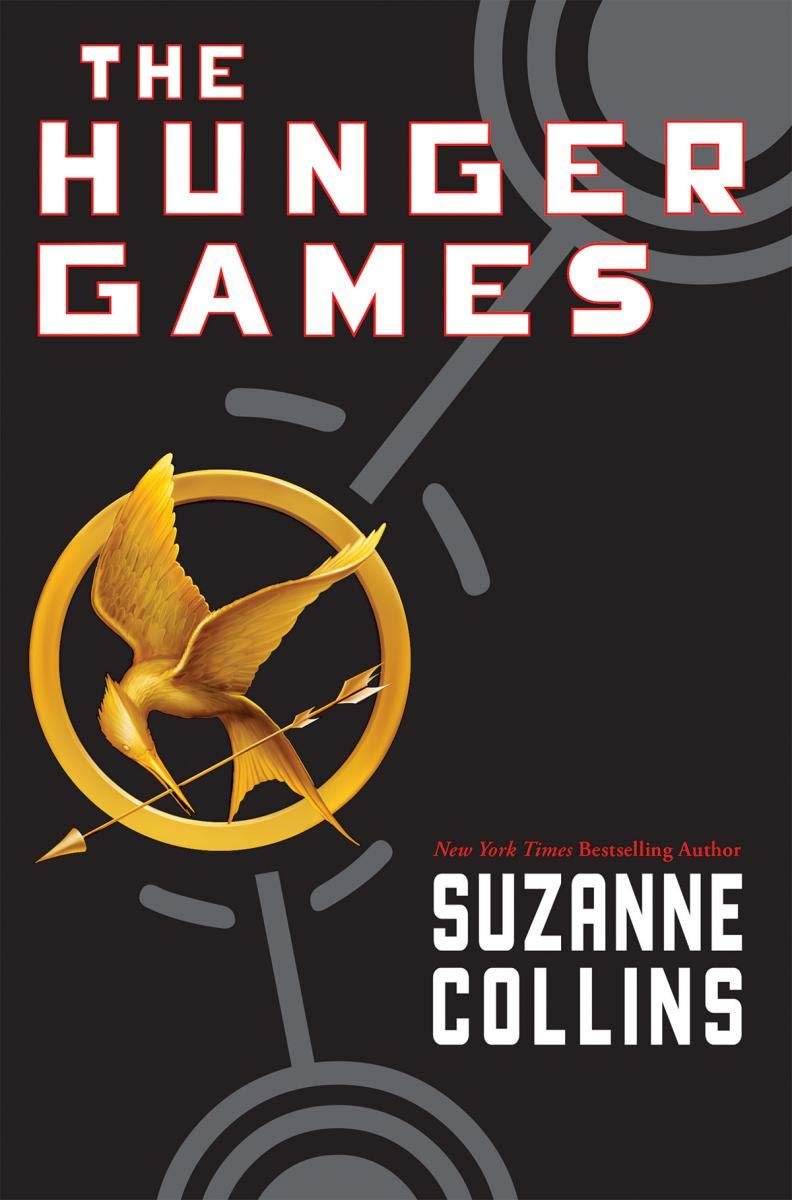Collins, Suzanne. The Hunger Games. Scholastic, 2009.
The Hunger Games is the first book to a dystopian trilogy that follows the perspective of Katniss Everdeen, a sixteen-year-old girl from District 12. The book is set in an eerily not-too-unfamiliar fictionalize setting where 12 districts serve in servitude to the Capitol with minimal rights after a lost rebellion some 74 years before. The Capitol reminds the districts of their betrayal by holding an annual Hunger Games for the Capitol’s entertainment and the district’s enduring punishment. Each district is forced to send one girl and one boy, between the ages 13 to 19, to fight to the death in the annual Hunger Games celebration. When Katniss’s thirteen-year-old sister’s name is drawn from the 74th Hunger Games, Katniss volunteers herself as tribute to the games in her sister’s stead. With the other chosen tribute from District 12, Peeta Mellark, Katniss struggles for her life in the Capitol’s blood games with one thought in mind: survive for the sake of her family. As Katniss fights back, little does she know that she is stirring up hope that has long been dead for the districts.
The Hunger Games is a novel that caters to students are in 7th through 9th-grade levels. This dystopian novel is not only interesting and engaging for many students, but it also offers a lot of educational significance in the classroom. According to one article, a school chose to teach The Hunger Games in their classroom because of “Collins’ critique of class politics, the novel’s emphasis on collective action against economic oppression, and the trilogy’s popularity with our students” (Marshall and Rosati). This novel could be used to teach TEKS 4.E, which states that students should practice “Comprehension skills: listening, speaking, reading, writing, and thinking using multiple texts. The student uses metacognitive skills to both develop and deepen comprehension of increasingly complex texts. The student is expected to: (E) make connections to personal experiences, ideas in other texts, and society” (TEKS). By using The Hunger Games, teachers can use characters that students have an emotional connection to relate to real class issues and economical oppression that is seen in the world today. The Hunger Games provides a platform of discussion for students to talk about these real-life struggles that we have seen through history and even in our current world today. Katniss teaches students that it is important to stand up for what you believe in, even if the world tells you the opposite. Another great factor in teaching The Hunger Games is Suzanne Collin’s strong female protagonist. But Katniss isn’t the perfect protagonist; in fact, she is extremely flawed. One person put that “Katniss... belongs to a recent tribe of popular heroines: the small, difficult teenage girl who manifests enormous physical and moral strength... representing female strength and female vulnerability all mingled and entwined, dangerously, ambiguously, into one” (Miller). Despite her flaws, this is what makes Katniss so relatable to many of the students that find themselves reading The Hunger Games. She is human, just like them. A girl who wants nothing more but to save her family from the injustices served to them by the Capitol. This presents a very compelling story and narrative for students of all backgrounds, making The Hunger Games a prime choice for teaching students in the classroom.
Although the book is a fantastic read, there are some concerns when it comes to content that teachers must be aware of. This book has was listed as the number five most frequently challenged books on the basis of “insensitivity, offensive language, violence, anti-family, anti-ethic, and occult/satanic” (Bonhaus). It is important to note that this book is extremely violent, as many of the characters are forced to kill the others in brutal ways. Katniss even seems to develop PTSD from these moments where is forced to protect her own life by killing another. Many parents worry that this book’s excessive use of violence will numb children to the effects of violence; however, it is important to note that Katniss and many of the main characters that are followed throughout the novel do not treat death or violence lightheartedly. Students can see the effects of committing such an atrocity, even if it is for one’s survival, through the nightmares the characters have to endure for the rest of their lives. Due to the violence, although this book is a 5th-grade reading level, teachers should probably use this book to teach students of the 8th and 9th-grade levels. This book should also be taught in a whole-class setting. It is important for teachers to frame this book correctly because of its violent nature, especially if teachers are using it to compare to historical events and even present issues and events today.
In the end, the parents get the final say. Alternative books that can be taught in place of The Hunger Games are classics such as The Giver by Lois Lowry, 1984, and Animal Farm by George Orwell. Although these books also deal with violence and class struggle, they are presented in a less realistic setting, creating some distance from the violence and the reader.
Overall, The Hunger Games is a great book that can inspire a plethora of great conversations in the classroom. The book’s powerful and realistic characters are what draw readers into the story.
Citations
Bonhaus, Allyson. "Why Ban ‘Hunger Games?’." The Leaf, 11 Apr. 2016, shsleaf.org/25923/ae/why-ban-the-hunger-games/. Accessed 4 May 2021.
Collins, Suzanne. The Hunger Games. Scholastic, 2009.
Marshall, Elizabeth, and Matthew Rosati. ""May the Odds Be Ever in Your Favor": Teaching Class and Collective Action with 'The Hunger Games'." Rethinking Schools, 2021, rethinkingschools.aidcvt.com/archive/28_04/28_04_marshall_rosati.shtml. Accessed 4 May 2021.
Miller, Caroline. "Teenagers and 'The Hunger Games'." Child Mind Institute, 28 Feb. 2019, childmind.org/article/the-hunger-games-on-the-big-screen/. Accessed 4 May 2021.

No comments:
Post a Comment